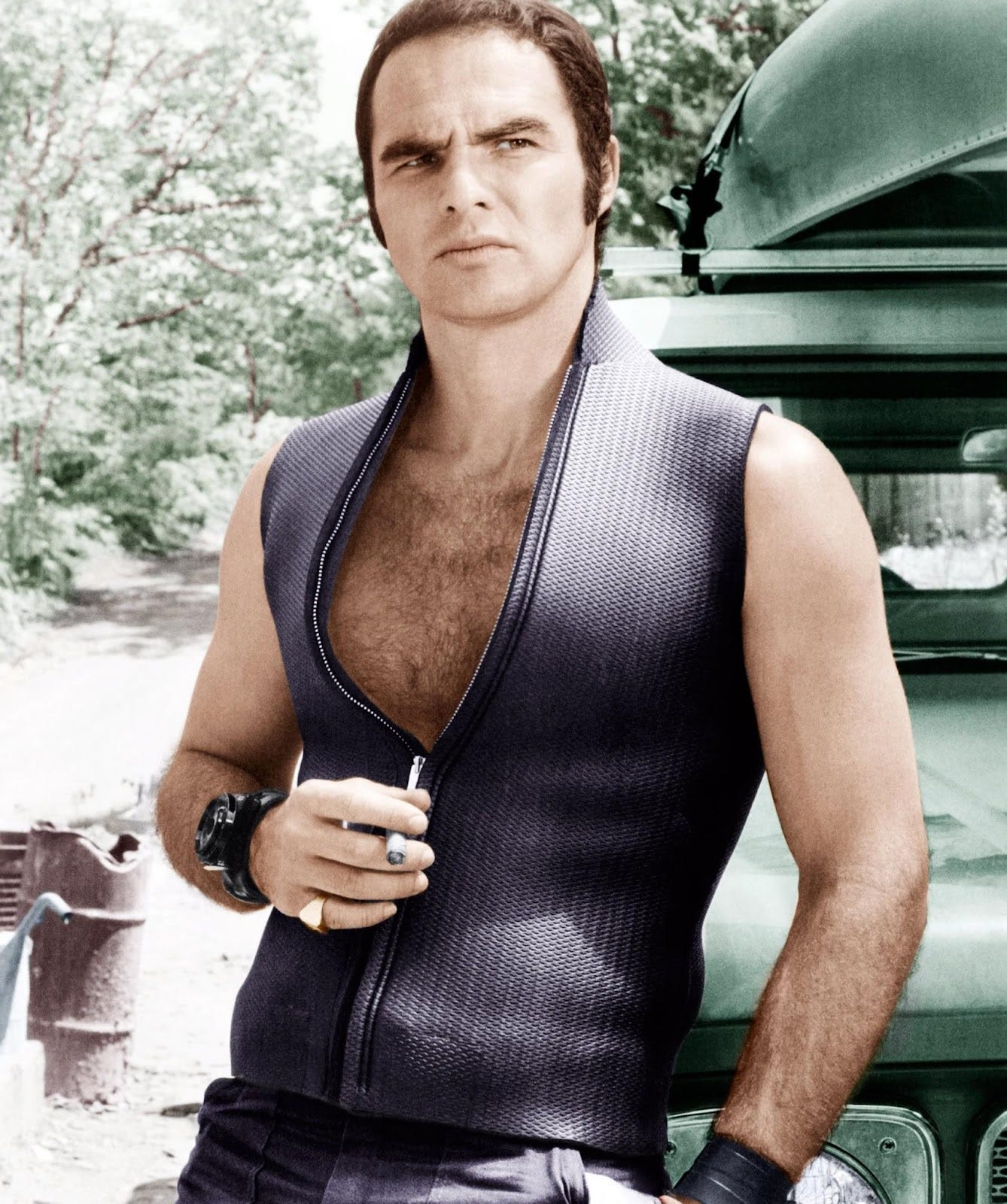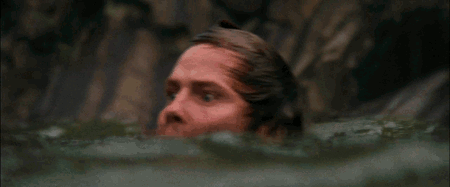How y’all doin’? Welcome back to another post from yer favorite newsletter. We were fixin’ to watch Deliverance, the 1972 Best Picture nominee starring Burt Reynolds and Angelina Jolie’s daddy, Jon Voight. So y’all best get gussied up, grab a paddle, and join us, ya hear!

Previews
What, if anything, did we know about this coming attraction before we watched?
Ellen: Movies named things like “Deliverance” always sound like they are going to be a slog to me. How am I to enjoy something with such a self-serious title? I will say, however, in the case of something like Atonement, I was totally wrong and completely loved it. Who’s to say that this won’t also defeat my preconceived notion?
Tyler: Amen on Atonement. Before hearing about the general plot of Deliverance on a podcast, I (once again) knew absolutely nothing about it. I totally agree that with a name like “Deliverance” it could’ve been anything from a serious drama about a nun falling in love with a Vietnam vet to a coming-of-age movie about a pizza delivery boy. Somehow the real answer — a group of men on a canoe trip getting hunted down by the local yokels — isn’t any less ridiculous. Time to find out how in tarnation this got nominated for Best Picture …
Plots & Feelings
This one’s pretty self-explanatory.
Short Version (courtesy of IMDb): Intent on seeing the Cahulawassee1 River before it's dammed and turned into a lake, outdoor fanatic Lewis Medlock takes his friends on a canoeing trip they'll never forget into the dangerous American back-country.
Long Version (modified from Wikipedia and formatted to fit your screen):
Here’s the thing: they’re going to build a dam on the Cahulawassee River, and outdoor enthusiast and survivalist Lewis Medlock simply has got to conquer it before the whole valley is flooded into a lake. He drags three friends2 (Ed, Bobby, and Drew) along with him on a Friday afternoon, promising to get them back to Atlanta in time for football on Sunday. They drive up to a dilapidated gas station and haggle for some locals to drive their cars to their end point. Nearly every interaction is tainted with mutual disdain3, but we do get a nice moment of levity when Drew gets into a banjo duel with a local kid. Anyway, Lewis makes it clear to the audience he’s a “real” man who’s never been lost and doesn’t believe in insurance or asking for help, and the group is off!
Ellen: Lewis wants to conquer this river for the same reason that I continue to eat leftover pizza: because it’s there!
Tyler: I don’t proclaim to know much about Burt Reynolds, but the fact that his character lasts all of two minutes before going sleeveless just feels right.

As they navigate increasingly difficult rapids, the group dynamics become clear: Bobby is the consummate city slicker that doesn’t belong; Drew’s a gentle soul enjoying nature; Ed is a normal level of outdoorsy and feels fairly comfortable; and Lewis fancies himself Tarzan. He proves this point with bow fishing, not using a tent, and having a patch that literally says “survival” on his jacket. In contrast, the next morning Ed shakes too badly to shoot a deer with his bow and clearly wishes to be more like Lewis. They switch up the partners, with Ed and Bobby teaming up and Lewis with Drew. The canoes are separated, and the first pair pulls over to take a break when they hear someone. Strike that: multiple someones…

A pair of mountain men (as Wikipedia would call them) emerge from the trees, one of whom has a shotgun. The four men chat uneasily, with the locals telling the city folk that they’ve taken a wrong turn. The conversation itself takes a wrong turn, resulting in a shotgun jammed into Ed’s chest. He’s tied by his neck to a tree while Bobby is humiliated and raped. When it’s Ed’s turn, he spots Lewis and Drew over his attacker’s shoulder when THWACK! An arrow from Lewis pierces the man through the heart, and the other assailant bolts for the trees. Drew wants to go to the authorities, whereas Lewis assumes they won’t get a fair trial from the small community and vies to get rid of the body. It’s put to a vote, and burying the man wins. One shallow grave later, the crew is back in the canoes, hitting their most serious rapids yet. Drew is seemingly too shocked to put on his life jacket or paddle and suddenly is over the bow of the boat! Everyone loses the rhythm in surprise and ends up going over themselves, left to fight the river only with life jackets.

Not quite a “purdy mouth” (Source) Ellen: Lewis initially says that they need to get rid of that guy “anywhere… everywhere,” and I thought for sure he was going to dismember that man with a Bowie knife or something.
Amidst the waterlogged chaos, the wooden canoe is destroyed, there’s no sign of Drew, and Lewis sustains a gnarly compound fracture. They come to a calmer spot on the river with rock walls on either side. Drew’s disappearance doesn’t seem to sink in with Ed until his busted guitar floats by. Lewis is adamant that Drew was shot from the cliffs above by the man who ran off earlier. They manage to recover the metal canoe and splint up Lewis’ leg so we don’t have to look at it anymore. Ed free climbs up the rocks with his bow. One stressful montage later, he’s at the top as night falls with an unconvincing film editing trick. As the sun rises, we see a man with a shotgun looking down river. Ed prepares to shoot him and eventually manages the murder. He lowers himself and the body back to the water on a rope, and they’re ahem, NOT SURE IT’S THE RIGHT GUY. Anyway let’s sink the body with rocks, nothing to see here.
Tyler: I found it interesting that after focusing so much on Lewis in the first half-ish of the movie, he’s essentially sidelined for the rest of it. Though I’m certainly not mad to see that wannabe Bear Grylls4 take a figurative (and literal) seat.
Ellen: Part of me did enjoy that the movie became about someone who seemed to even see himself as a side character in Lewis’ story until he was forced to take charge.
They resume their painful journey downriver and eventually come upon Drew’s body. There’s no evident bullet hole, but maybe there could be? It’s unclear, so they weigh down their friend’s corpse with yet more rocks and move on. Finally reaching the shoreline of the dam construction area, lo and behold: their cars are there! The Dueling Banjos kid calls for help, and they get Lewis into an ambulance. Ed and Bobby end up at a B&B with excellent corn, apparently, and PTSD sets in. Soon enough, cops arrive to question the trio, and they agree to lie through their teeth to avoid prosecution for the trail of bodies in their wake. The sheriff gives them a lecture about wanting the town of Aintry to die in peace, and tells them to git. Ed finally returns home to his family, but is plagued by nightmares of waterlogged bodies rising to the surface.
Ellen: That final shot of the bloated hand rising out of the water gave me major Friday the 13th vibes.

Wiki-Wiki-Whaaat?
Love a good Wikipedia rabbit hole in search of some fun facts? Us too.
Deliverance’s Wikipedia page has some interesting facts and anecdotes that we recommend you read through, but here are a few of our favorites:
Deliverance is based on the 1970 novel of the same name by author James Dickey. Prior to becoming an author, Dickey served in the military, earning five Bronze Star Medals for his service during World War II and the Korean War; taught English at several colleges, including Ellen’s alma mater Rice University back when it was Rice Institute; and was a very successful copywriter for advertising agencies. All the while he worked on writing poetry, which he was best known for prior to writing Deliverance, his debut novel.
Dickey not only wrote the screenplay for Deliverance, but also had a small cameo as a local sheriff towards the end of the movie (despite drunkenly punching the director earlier in shooting). Other fun cameos include Ned Beatty’s wife Belinda and director John Boorman’s son Charley as the wife and child of Jon Voight’s Ed.

The young actor who played “Dueling Banjos” in the beginning of the movie, Billy Redden, actually didn’t know how to play the instrument, and was cast entirely for his looks. While filming the banjo scene, Redden would wear a special shirt that, combined with careful camera angles, concealed the real banjo player, Mike Addis, behind him. The music heard in the film was recorded separately, recorded by Eric Weissberg and Steve Mandell.

Of the many wild stories surrounding Deliverance’s production, one that stuck out was the fact that they cut costs by not insuring the production and having the actors do their own stunts. The lack of insurance was coyly referred to early in the movie when Reynolds’ character says “I don't believe in insurance. There's no risk.”
Ellen: This could not be further from the attitude of your authors, who audibly groaned at this line.
After the success of the film, Georgia Governor Jimmy Carter established a state commission to encourage TV and movie production in Georgia, which clearly paid off well for the state.
Oscar NomNomNomz
Since we all know a movie is nothing without the food and drink it incorporates.
It’s now time to award the Oscar for Best Snacktor in a Supporting Role5. And the nomnomnominees are:
Freshly caught bow and arrow fish
Anonymous campfire booze
Georgia sweet corn
And the Oscar goes to … freshly caught bow and arrow fish! Unfortunately, Burt Reynolds ate the fish raw to prove his manliness, so we will accept this award on its behalf.

Ellen: I’m not surprised, that Georgia corn’s got nothing on the corn from Wendte Farms.
Georgia Corn: KEEP MY NAME OUT YO F***ING MOUTH!
Ellen: Relax, it’s a joke about corn in a fake award section of a movie newsletter …
Georgia Corn: (slaps Ellen)
ILTBTA Producers: Oh crap, cut to commercial CUT TO COMMERCIAL!
Intermission
Even though ILTBTA is free, please indulge us further and enjoy this quick “advertisement.”
This installment of ILTBTA is brought to you by … the concept of insurance!
Are you about to undertake something extremely expensive and risky? Trying to cut corners and save some money along the way? Well: don’t. Whether you’re driving a car, planning a honeymoon on the other side of the world, or filming a multi-million dollar movie, avoid some risk by investing in insurance.
Don’t think you can afford it? In-sure you can!

Fill In The Blank
How did we really feel about The Academy nominating this?
Ellen: I’d like to turn in my life jacket and paddle to the Academy and head back to Atlanta. I thought this movie was appropriately tense and stressful when it needed to be, but I am just not a big fan of the man v. elements v. man plotline. I liked that the most “prepared” of them was taken out of commission and thus forced Ed to step up, and they all had to come to terms with what they were willing to do in extreme situations. I wanted them all to get through, and after reading how crazy production was, we should count ourselves lucky that a deer was the only real casualty! I thought all of the actors did a great job, but overall, I’m not surprised that this lost to The Godfather.
Tyler: I’d like to politely decline the Academy’s invitation for a canoeing trip and just take a leisurely hike through a well-maintained park instead. I somewhat understand the appeal (some universal themes of man vs. nature and urban vs. rural, the scenic setting, the ~drama~ of a murder cover-up), but it just didn’t hit for me. To a lesser extent it reminded me of The Revenant, in that a survival story through a beautiful natural environment can also be a SLOG regardless of how well-acted or -shot it is. I also love a good cinematic score, and aside from some light banjo strumming, there isn’t much of one, so things seem to just kind of … happen. Maybe it was a deliberate move on the director’s part, or maybe they didn’t have room in the budget for anything else, who knows? To its credit, Jon Voight gives a fantastic performance6 and it very well could have influenced/created the “boys trip gone wrong” sub-genre (looking at you Without a Paddle and The Hangover).
Let The Credits Roll
Thanks for reading! Some quick housekeeping as you exit the theatre:
If you have plots and feelings of your own (on the movie or ILTBTA in general), feel free to comment on the post or simply reply to the email. If you liked reading this: tell your friends! If you hated reading this: tell your friends how much you hated it by forwarding it to them!
If you’re a weirdo like Tyler and use Twitter, feel free to follow us there @BlankTheAcademy for ILTBTA updates, rejected jokes, and other random movie-related musings. Once we reach a million followers, we’ll offer to purchase the @ILTBTA handle from the butthead who snagged it before us.
If you’d like to start a wild Best Picture journey of your own, feel free to download a copy of The Spreadsheet. Bonus: checking off the boxes is oddly satisfying.
For pizza’s sake, GET YOUR COVID VACCINE AND BOOSTER! Wear a mask. Get tested. Don’t be an idiot.
Post-Credits Scene
Get a sneak peek at the next ILTBTA installment.
Thought we were done with silent movies for a while? Guess again, because for our next ILTBTA post we’re watching the 1928 silent crime drama The Racket. Starring a bunch of people you’ve never heard of and produced by someone you may have (Howard Hughes), The Racket tells the tale of one police officer’s valiant fight against corruption in Prohibition Era Chicago. The movie is blessedly available in its entirety for free on YouTube.
Until then, remember: we don’t talk about banjooooooooooooos.
Ellen: Written in my notes as: Calllloucohause
Tyler: Are we even sure they’re friends?
Sounds like my ex-wife!
Bear Grylls, a man who (presumably along with his wife) knowingly named two of his children Marmaduke and Huckleberry.
Results tabulated and certified by the accountants at Ernst & Yum™.
Now I can recognize him as something other than Nic Cage’s dad in National Treasure.




